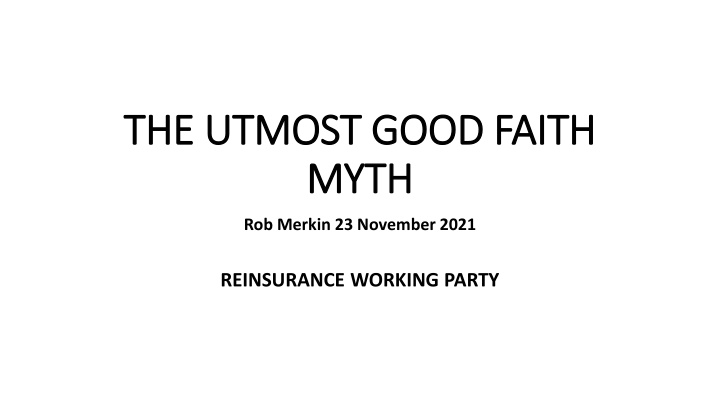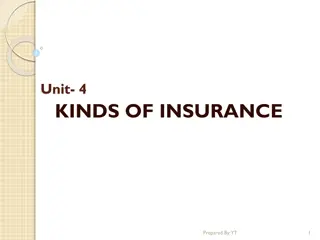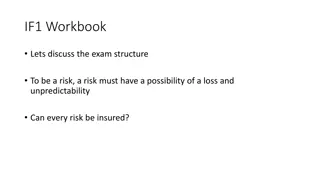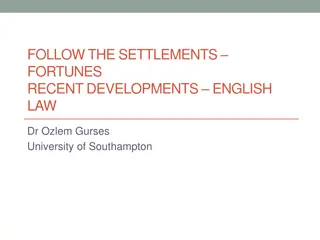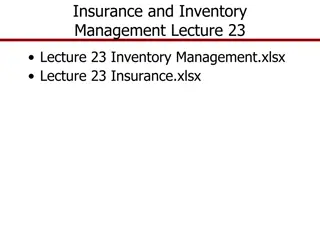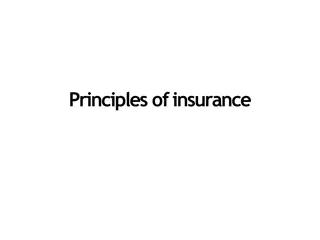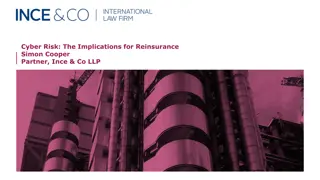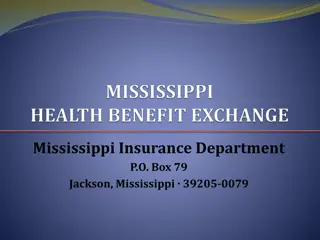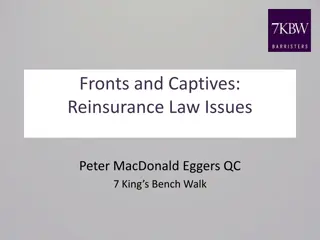The Utmost Good Faith in Insurance and Reinsurance
The concept of utmost good faith in insurance traces back to historical cases like Carter v. Boehm in 1766, with its origins found in the marine insurance industry. Over time, this principle evolved and became codified in the Marine Insurance Act 1906. In recent years, the concept has been revisited and amended with the Insurance Act 2015, reshaping the duty of fair presentation in reinsurance contracts. Despite its evolution, the application of utmost good faith in reinsurance cases has not been significant compared to cases related to disclosure and representations.
Download Presentation

Please find below an Image/Link to download the presentation.
The content on the website is provided AS IS for your information and personal use only. It may not be sold, licensed, or shared on other websites without obtaining consent from the author.If you encounter any issues during the download, it is possible that the publisher has removed the file from their server.
You are allowed to download the files provided on this website for personal or commercial use, subject to the condition that they are used lawfully. All files are the property of their respective owners.
The content on the website is provided AS IS for your information and personal use only. It may not be sold, licensed, or shared on other websites without obtaining consent from the author.
E N D
Presentation Transcript
THE UTMOST GOOD FAITH THE UTMOST GOOD FAITH MYTH MYTH Rob Merkin 23 November 2021 REINSURANCE WORKING PARTY
ORIGINS ORIGINS Optima uberrima fidei first mentioned in Corbet v Cochran (1707) 4 Bro Sup 678 (disclosure) Leading case of Carter v Boehm (1766) 3 Burr 1905 referred only to good faith : Good faith forbids either party by concealing what he privately knows, to draw the other into a bargain, from his ignorance of that fact, and his believing the contrary First mention of utmost good faith was in Wolff v Horncastle (1798) 1 B & P 316, repeated in Palmer v Pratt (1824) 2 Bing 185 reliance on insurable interest defence Various mentions of perfect , absolute in the 1860s, all to do with disclosure and misrepresentation. Two non-marine references to utmost good faith in property fraudulent claims cases, but the courts were applying express clauses
CODIFICATION CODIFICATION Marine Insurance Act 1906, section 17 (replicated throughout the common law world other than NZ) A contract of marine insurance is a contract based upon the utmost good faith, and, if the utmost good faith be not observed by either party, the contract may be avoided by the other party. Appears under heading disclosure and representations and sections 18-20 are all about those matters No authority for any wider duty of utmost good faith in 1906 Courts struggled to find post-contractual duties of utmost good faith in cases in 1980s and 1990s, but failed because the only remedy is avoidance
UTMOST GOOD FAITH AND REINSURANCE UTMOST GOOD FAITH AND REINSURANCE No reinsurance case (other than disclosure and representations) that has turned on utmost good faith. All cases decided on other grounds Gan Insurance v Tai Ping [2001] Lloyd s Rep IR 229: duty on reinsurer to act rationally in exercise of discretion in accepting reinsured s settlement Eagle Star v Cresswell [2004] EWCA Civ 602: duty on reinsurer to act rationally in deciding whether to take over control of defence Equitas v MMI [2019] EWCA Civ 718: implied duty on reinsured not to spike claims Discretion dealt with by Braganza principle; implication of terms a principle of law. No duty of utmost good faith in the general law (Pakistan Airline v Times Travel [2021] UKSC 40) but is there any difference?
EFFECT OF INSURANCE ACT 2015 EFFECT OF INSURANCE ACT 2015 Section 17 amended by 2015 Act A contract of marine insurance is a contract based upon the utmost good faith, and, if the utmost good faith be not observed by either party, the contract may be avoided by the other party. Utmost good faith no longer used for disclosure and representations, now the duty of fair presentation in reinsurance Avoidance remedy has gone, so does section 17 have new life? Interpretative provision, but how does that differ from the general law on construction? Not an implied term but could it be used to imply terms? See approach in NZ: Southern Response v Dodds [2020] NZCA 395 Real risk of rewriting contracts
LESSONS FROM THE AUSTRALIAN LESSONS FROM THE AUSTRALIAN IMPLIED TERM IMPLIED TERM Insurance Contract Act 1984 does not apply to reinsurance but sets out principles governing other insurance contracts: section 13(1) implied term of utmost good faith section 14(1) reliance on contract term without utmost good faith (one use, heavily criticised for rewriting) Do these sections have any substantive effect? Cases show they are all about process and do not alter or add to rights Diamond World v Catlin [2021] NSWSC 1431: insurers in breach of duty by demanding records known not to exist; assured in breach of duty by having shop cleaned before inspection. BUT no effect on outcome: insurers liable for claim; assured unable to claim for loss that could not be proved
